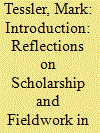| Srl | Item |
| 1 |
ID:
167347


|
|
|
| 2 |
ID:
049670


|
|
|
|
|
| Publication |
The Emirates Centre for Strategic Studies and research, 1997.
|
| Description |
40p.
|
| Series |
the emirates occasional papers 2
|
| Standard Number |
0863566014
|
|
|
|
|
|
|
|
|
|
|
|
Copies: C:2/I:0,R:0,Q:0
Circulation
| Accession# | Call# | Current Location | Status | Policy | Location |
| 039324 | 327.172/TES 039324 | Main | On Shelf | General | |
| 040490 | 327.172/TES 040490 | Main | On Shelf | General | |
|
|
|
|
| 3 |
ID:
190885


|
|
|
|
|
| Summary/Abstract |
What prolonged implications does conflict escalation have on voting behavior? The literature focuses primarily on the immediate effect of violent events on voting in nearby elections, leaving open questions about longer-term consequences. This article examines this question by studying Israel, where violent escalation in the Israeli–Palestinian conflict in the early 2000s was followed by an unexpected electoral outcome: the emergence and consolidation of a new centrist bloc that transformed a longstanding Left-Right partisan divide into a three-bloc system. Using two decades of survey data, it is argued that this shift is best explained by a long-term attitudinal change toward the conflict by many Israelis after the escalation. Rather than a strictly hawkish shift, many voters have become ‘Doubtful Doves’: supportive of territorial compromise in principle, but skeptical about reaching an agreement with the Palestinians in practice. This underdiscussed attitudinal structure, dovish but doubtful, has formed a new electoral base for centrist parties, breaking the traditional Left-Right dichotomy. These findings illustrate that violent periods in conflicts can cause non-trivial long-term changes in popular attitude structures and voting patterns, which, under the right conditions, can trigger electoral re-equilibration.
|
|
|
|
|
|
|
|
|
|
|
|
|
|
|
|
| 4 |
ID:
085113


|
|
|
|
|
| Publication |
2008.
|
| Summary/Abstract |
Mansoor Moaddel, Mark Tessler, and Ronald Inglehart use findings from two national values surveys that were carried out in Iraq in 2004 and 2006 to determine the attitudes of the Sunni Arabs toward Saddam Hussein, which they use as a proxy measure of their attitudes toward the Sunni insurgency and American-led coalition forces.
|
|
|
|
|
|
|
|
|
|
|
|
|
|
|
|
| 5 |
ID:
076884


|
|
|
|
|
| Publication |
2007.
|
| Summary/Abstract |
Findings from representative national surveys in Algeria and Jordan show that neither religious orientations, judgments about Western culture, nor economic circumstances account for variance in approval of terrorist acts against U.S. targets. Alternatively, in both countries, approval of terrorism against the United States is disproportionately likely among men and women with negative judgments about their own government and about U.S. foreign policy. Taken together, these findings suggest that approval of terrorism is fostered by negative attitudes toward actors considered responsible for the political and economic status quo. Given that Algeria and Jordan have had different experiences with respect to terrorism and also differ in demographic, political, and economic structure, identical findings from these dissimilar countries suggest that the observed relationships are not country specific and may apply more generally.
|
|
|
|
|
|
|
|
|
|
|
|
|
|
|
|